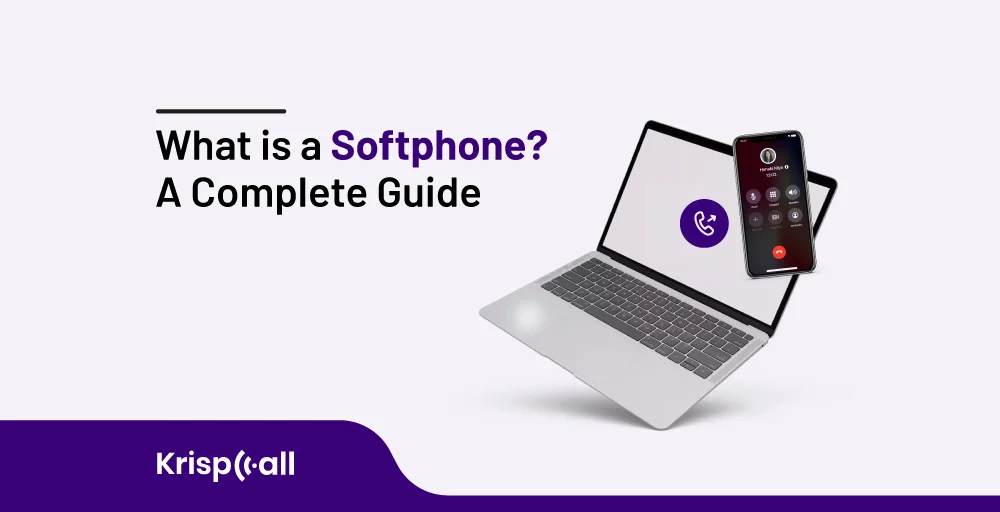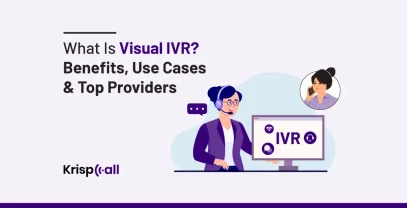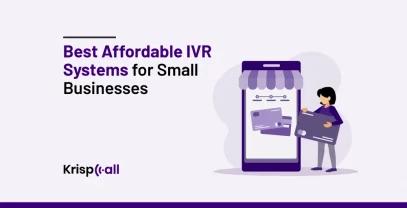Hey there! Have you ever felt like your work phone is holding you back? Like you’re chained to your desk just to make telephone calls? ☎️
Well, you aren’t alone. There are many people out there going through that problem every single day.
Knowing the fact that staying connected with prospects is essential; you need a versatile communication tool that lets you conduct your business communication easily and effortlessly. One such tool is “Softphone”.
In this blog, we’re going to break down everything about softphones – what they are, how they work, how they’re changing the way we communicate, and how to set them up.
🔑 KEY HIGHLIGHTS
- Softphone allows you to make phone calls over the internet connection with any device, computer or mobile device.
- Some must have features in Softphone include shared phone number, voicemail, call recording, integration capability, call forwarding, etc.
- A softphone costs $10 to $70 on average.
- KrispCall is the best VoIP softphone system in terms of pricing, advance features, uptime & customer support.
What is a softphone?
A softphone is a software-based phone system that lets users make phone calls over an internet connection without the need for any specialized hardware devices. It is a web browser-based application that works using a VoIP (Voice over Internet Protocol) system.
Softphone lets users make calls with the use of a computer or mobile device. It provides advanced features such as Voice Calls, Instant messaging, Phone calls, Call forwarding, Video conferencing, Texting, etc.
An example of a Softphone is ‘KripsCall’, a cloud-based softphone solution designed for businesses of all sizes, offering compatibility, global reach, and unmatched features. It offers a VoIP softphone that lets you integrate with various tools at an affordable price.
How does a softphone work?
Softphone works by using VoIP (Voice over Internet Protocol) technology to transmit voice data via the internet connection rather than any traditional phone lines. Softphone lets users make and receive calls and videos through the Internet using any device.
Softphone somewhat resembles traditional telephone functionalities; however, it operates over strong bandwidth, offering features such as voicemail, call recording, conference calling, and integration with different communication tools like email.
The software runs on various platforms, like Macs, Windows devices, and web browsers, guaranteeing accessibility to users with a microphone and speaker for communication. With the use of softphone technology, users can enjoy efficient communication experiences.
What key features should a business softphone have?
Suppose you are considering switching to a business softphone; it is important to recognize the key features it poses.
- Shared Phone Number: Business softphones should allow users to share phone numbers among team members. It will establish smooth communication within the business and make it convenient for staff or employees to get the client’s contact details.
- Voicemail: One of the crucial features that a business softphone should have is Voicemail, which allows users to receive and operate voice messages when unavailable. It includes features such as visual voicemail, voicemail-to-email setup, and incoming call notifications for effective communication.
- Call Recording: For quality control, compliance, and record-keeping needs, business softphones should include call-recording functionalities. This functionality allows users to easily record calls for future use, such as reference or training.
- Text Messages: Business softphones should have text-messaging capabilities that help users send and receive text messages directly from the application. Therefore, centralized communication helps in organizing and managing business communication effectively.
- Integration with your favorite tools: Business softphones should support integration with essential tools like CRM systems, email clients, and project management platforms to ensure seamless workflow and enhance productivity.
- Presence management: Business softphones should offer presence management to show users’ availability status, letting their colleagues or boss know if they are free, busy, or away. This feature improves real-time communication and collaboration within the business.
- Call forwarding: Call forwarding is what every business softphone must have to let users redirect incoming calls to another number or extension when required, which ensures that important calls or any calls are not missed even when users are unavailable.
- Call Transfer: An important feature of business softphones is call transfer, which allows users to transfer ongoing calls to other departments or individuals to enhance customer service and internal communication efficiency.
Softphone Vs Hardphone: What are the differences?
We have created a table to show you a clear and concise comparison between softphones and headphones based on their different characteristics. Keep scrolling to get a quick and easy-to-read difference between these two types of communication devices.
| Characteristic | Softphone | Hardphone |
|---|---|---|
| Hardware | No additional hardware is required. The download is accessible on desktops, laptops, and tablets. | Requires a physical IP phone handset. |
| Installation | Download the app, sign into your account, and start using it instantly. | Requires an ethernet, power wiring, and additional configuration. |
| Portability | It can be used whenever there is an Internet connection, including LTE and 5G cellular data. | Limited to wiring and physical office spaces. |
| Flexibility | It is tailored to users’ preferences and business needs. | Limited to VoIP hardware functionality and headsets. |
| User Interface | Software-based GUI elements for all features, working with keyboard and mouse shortcuts. | Physical buttons like a dial pad or touch screens with a full graphical user Interface. |
| Mobility | Can be used on any compatible device like a computer, tablet, or smartphone with an internet connection. | Typically stationary, cannot be moved around. |
What are the benefits of using softphones for business?
Softphones offer on-the-go business phones that are portable and easy to carry anywhere, along with advanced features. Below, we have curated the list of the benefits of using softphones for business:
Softphones save your time and money
Softphones operate over the internet connection, making long-distance and international calls more affordable compared to traditional landlines by eradicating the need to buy phones and minimizing hardware costs. Also, it is easy to set up and requires no lengthy installation process, saving time.
Enhanced Portability
Softphones let users use their phone lines from laptops or smartphones, letting them use it from any location with an internet connection. Therefore, softphones offer businesses the flexibility and ease of using business phone lines from different devices and locations, eventually enhancing portability.
Accessible anywhere on any device
Softphones are accessible on various devices or platforms, such as Windows, macOS, Android, and iOS, according to different preferences among users. It can be easily transferred between devices, increasing versatility.
Packed with advanced features
Softphones have a package of advanced features that improve business operations. It provides features including call forwarding, Interactive Voice Response (IVR), voicemail, call analytics, video calls, and integration with CRM systems.
Easy Integrations with Business Tools
Softphones integrate easily with business tools such as CRM systems, e-commerce platforms, email platforms, and helpdesk software to enhance softphone functionality and streamline communication within the organization. They also integrate with third-party apps like click-to-dial and email, creating unified and advanced communication.
What are the disadvantages of softphones?
Although softphones have many advantages, they have some disadvantages, which are stated below:
Must have an Internet connection
Softphones usually depend completely on a reliable Internet connection for functionality. If there is no stable internet connection, softphones might not function effectively, resulting in unstable performance.
Call quality may fluctuate
Call quality may fluctuate depending on a device’s internal microphone and speakers. Such conditions lead to inconsistency, which eventually results in bad call quality, unlike what is typically experienced with traditional phones.
Dependent on power and battery availability.
Softphones work through the power and battery; thereby, they completely depend on a stable power supply and battery. Softphones cannot perform if there is a power outage or loss of electricity. Therefore, softphones need a backup power source or a physical phone to fall back on.
How to Set up a Softphone?
Setting up a softphone is easy to do, which you can do by following these five general steps mentioned in the following section:
- First and foremost, Choose a Softphone provider, confirm your softphone extension number, and ensure your headset is connected to your device.
- Secondly, download and install the softphone from the softphone’s website.
- After that, configure the application’s settings by setting up parameters such as username, displayed name, network settings, codecs, etc.
- Then, check if your device has network access to the server and audio input or output functionalities.
- After configuration, test the softphone app by making calls and exploring its features.
How much does a softphone cost?
A softphone costs approximately $10 to $70 on average, but the cost varies depending on the service provider, the features, and the subscription plan.
Sometimes, the price might go on a monthly or annual subscription, depending on your purchased plan. There can be extra charges for advanced features or extra services like call center functionality or international calling packages.
Moreover, there might be licensing fees depending on the number of users or multiple numbers of calls at the same time.
What are the things to consider while choosing the best softphone app for business?
There are various things required to consider before deciding to choose a softphone. Below, we have mentioned some important things to know when choosing the best softphone app for business:
Integration Compatibility
Integration compatibility is very crucial when choosing the best softphone app as it guarantees that all systems work together smoothly. By being compatible with various systems, softphones can integrate with email clients, CRM systems, and collaboration platforms, resulting in streamlined workflows and enhancing communication efficiency within existing software. It also saves time on tasks, reduces errors, and increases productivity.
Advanced Security Measures
Advanced Security protocols are significant things to consider when choosing the best softphone app for your business as they protect data from potential threats via data encryption and multiple security protocols such as Transport layer Security (TLS). Furthermore, it mitigates threats like eavesdropping by implementing access control features.
Easily scalable with your business
When choosing the best softphone app for your business, consider the scalability it offers as your team and business grow. Ensure it can offer sufficient phone lines and allow you to add accounts as needed without compromising any functionalities or capabilities.
Delivers Exceptional Customer Service
Prioritize a softphone provider that provides excellent customer service, as it directly affects customer satisfaction and overall business success. When searching for the best softphone provider, KrispCall is a standout choice as it offers 24/7 human support, ensuring that customer queries and issues are promptly addressed.
Call anywhere, on any device with KrispCall
Want a softphone that allows you to initiate phone calls from any device and location? Then consider KrispCall.
KrispCall’s softphone is compatible with several devices, like cell phones, laptops, PCs, computers, and any other internet-connected devices.
Also, KrispCall offers all the key features you’d expect from a modern softphone. Beyond calling and messaging functionality, KrispCall’s softphone comes with a bundle of features like voicemail to email, call forwarding, Interactive Voice Response (IVR), voicemail, shared number, etc.
The best part is its softphone has integration capability. If you are using CRM software/productivity tools like Zapier, HubSpot, Microsoft Dynamics 365, Google Workspace, etc, to enhance your business operation, then you can integrate it with those tools. With this integration, you can further do so many things like automate manual data entry, sync contact on both platforms, record call logs automatically, and much more.
Conclusion
A VoIP softphone isn’t only necessary but has become a must-have product in every business, regardless of size and type. Its features, like call routing, IVR, voicemail, call monitoring, video conferences, etc., offer business flexibility and convenience in telephone conversations.
Nonetheless, one needs to consider several factors while choosing the best softphone for their business, such as integration compatibility, features included, security, user-friendliness, and price, among others.
One reliable VoIP softphone you can go for is KrispCall. Sign up for KrispCall today and change the way you communicate with clients and business partners.
FAQ
Is a softphone the same as VoIP?
Yes, A Softphone is the same as VoIP since they are interconnected to each other through a modern communication system. They are alike since Softphone employs VoIP technology to make phone calls over the internet, and just like VoIP, Softphones can be used on a computer, tablet, or mobile device.
What is needed for a softphone installation?
A softphone installation requires a laptop or PC with a microphone and speakers and a modern smartphone or tablet with a substantial bandwidth or internet connection.
How to use a softphone?
To use Softphone, follow these three steps:
- Download the Softphone software application.
- Set up an account.
- Make sure you have a stable internet connection and start making calls.
What does a softphone look like?
A softphone generally looks like a traditional phone with a display panel and interactive buttons, which is used with a headset or USB phone connected to a computer’s sound card.
How to use a softphone on the computer?
Follow these simple instructions to use a softphone on the computer:
- Create and set up your account on the softphone, filling out information like your username, password, and other information.
- Connect and Configure the audio settings of the microphone and speaker.
- Learn features by going through its interface to make the most use.
- Select contacts or dial phone numbers on the softphone software’s dial pad and initiate making calls.
Which VoIP provider has the best softphone system?
KrispCall is the leading VoIP service provider with the best softphone system. KrispCall offers softphone at a reasonable price without affecting its quality. Its softphone is packed with several advanced features like voicemail to email, call forwarding, Interactive Voice Response (IVR), voicemail, shared number, etc.





